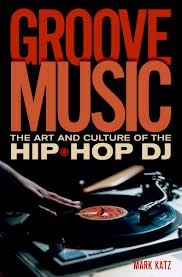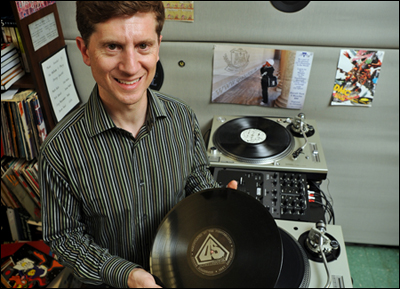Interview with Mark Katz, author of "Groove Music"
 A few months ago I heard author/professor Mark Katz interviewed on Billy Jam's "Put the Needle On The Record" Radio show. I'd heard about Groove Music and had been meaning to read it, but it wasn't until after hearing Mark speak with Billy Jam (Hip Hop Slam) that I immediately ordered the book and proceeded to devour every page. I like to read and am a Hip Hop DJ myself, so there was no excuse not to read this. I'd read other books that touch on turntablism (notables I recommend: Last Night a DJ Saved My Life, Can't Stop Won't Stop, & Making Beats: The Art of Sample-Based Hip Hop), but this is the first book I'd ever seen to focus exclusively on the topic of Hip Hop DJing.
A few months ago I heard author/professor Mark Katz interviewed on Billy Jam's "Put the Needle On The Record" Radio show. I'd heard about Groove Music and had been meaning to read it, but it wasn't until after hearing Mark speak with Billy Jam (Hip Hop Slam) that I immediately ordered the book and proceeded to devour every page. I like to read and am a Hip Hop DJ myself, so there was no excuse not to read this. I'd read other books that touch on turntablism (notables I recommend: Last Night a DJ Saved My Life, Can't Stop Won't Stop, & Making Beats: The Art of Sample-Based Hip Hop), but this is the first book I'd ever seen to focus exclusively on the topic of Hip Hop DJing.
Mark does an excellent job breaking down the history and culture of Hip Hop DJs, often going straight to the source and letting the pioneers themselves share their stories. He builds on what those other books I mentioned started, but takes it to levels never before seen in print (for example, going deep into the famous "ISP vs. X-Men" battle from 1996). Mark writes with a scholarly flare that reflects his academic background, which makes the book even more engaging because he's able to draw some really interesting connections and conclusions. He also writes with a passion that's contagious and treats the subject matter with the utmost respect. Needless to say, it's become my new favorite book and I can't thank him enough for writing it.
Mark was kind enough to answer some questions after I reached out to him. Check it out below!
MARK KATZ: INTERVIEW WITH QSU
QSU: How has the book been received amongst DJs? Personally, I love it - but have you come across any negative feedback?
Mark: So far, I've only gotten positive feedback, I'm happy to say. (Maybe the haters are just being quiet.) Heroes of mine like Qbert, GrandWizzard Theodore, and Rob Swift have praised the book, and I've gotten messages from DJs from around the world telling me how much they like it. I was really nervous about how DJs would respond, so the kind words I've been hearing have been gratifying and humbling. I don't know if there's any single reason DJs like the book, but I think some of it has to do with the fact that DJs themselves have an important voice in my book. I let them do a lot of the talking.
QSU: Have you found a general audience for the book? What has been the reaction amongst non-DJs / non Hip Hip DJs? Are you teaching this in any of your classes?
Mark: I think the book is starting to find a general audience. I've also gotten great feedback from academics, and I'm really pleased that both DJs and academics seem to like the book. And yes, I've assigned the book in a class I teach at UNC-Chapel Hill called The Art and Culture of the DJ.
QSU: What have you noticed since you finished writing the book? Any new trends, innovations, developments, etc. that you would want to include in a later edition?
Mark: I have a number of DJ friends on Facebook and in North Carolina, and I'm always learning from them about what's new, whether it's new equipment (it seems like more and more controllers are coming out nowadays) or new genres or subgenres, like dubstep and trap.
QSU: Has your interested in scratching/turntablism changed at all since writing the book? Are you practicing/working on any music projects?
Mark: I've loved the sound of scratching since I first heard Grandmixer D.ST scratch on "Rockit" in 1983. But writing the book gave me the opportunity to learn how to do it myself. I took some classes at the various branches of the Scratch DJ Academy, I watched Qbert's how-to DVDs, and I also bought my own turntables to practice on. I have to admit, though, that I'm not very good. Great DJs often practice for hours every day. I spend more time writing and teaching about DJing. I look forward to spending some quality time with my decks, however.
QSU: Hamster or regular? Vinyl or DVS?
Mark: I prefer hamster and vinyl. I have Serato and if I were a gigging DJ, I'm sure I'd use it more.
QSU: What are your favorite DMC/battle routines?
Mark: Tough question. Here are a few: Steve Dee, 1991 US Finals; Rob Swift's "Nobody Beats the Biz" routine; Qbert's second routine in the 1996 Invisibl Skratch Piklz vs. X-Men battle (and about a dozen others); selected routines by Cash Money, Craze, Vajra, and others.
QSU: What are your thoughts on controllerism? Also, what you think of the use of dicers on turntables that do with a push of a button what used to take years to master (i.e. digital audio chopping/live remixing)? Is this progress or dilution? Will this make traditional backspinning/beat juggling less valued or more valued? If the audience can't see you manipulate the sound, does it matter it's manipulated (i.e. is the end sound result all that matters?)
Mark: I have mixed feelings about controllers and dicers. If they allow new and creative forms of music making, then I'm all for them. If they prevent DJs from deepening their musicality because they allow them to bypass the process of developing fundamental skills, then I'm not for them. So their value depends on how they are used. And I do think that it's important for audiences to be able to see how the sound they hear is being manipulated. People still go to piano recitals and orchestra concerts, and they go because they want to see *and* hear how the music is made. If turntables are musical instruments, the same should be true for them.
QSU: Have you noticed a "watering down" of DJ skills since the DVS Revolution? Now that "everyone is a DJ", what does this mean for the hardcore Hip Hop DJs? Is there still a place for the traditional vinyl Hip Hop DJ (much like those of the mid 90s)?
Mark: If certain talentless celebrities can be DJs, then anyone can be a DJ. This development does worry me, but not too much. They'll get tired of faking it at some point, and the real DJs will remain. Sure, there's still room for hardcore turntablists. I have some students in my DJ class that are dying to develop their skills on vinyl and are willing to put in the time. It's a select group that's willing to dedicate themselves to the art, but then it always was.
QSU: What do you think about Qbert Skratch University? Unlike other DJ academies, QSU is only online and students are encouraged to go at their own pace. The focus is primarily scratching, and the turntable is treated as an instrument just as our other online music schools. Qbert gives feedback to students who submit videos, and his emphasis is often on using fundamentals to develop your own style.
Mark: I love QSU. First of all, because Qbert started it, QSU has all the credibility in the world. Second, it's clear that he really cares about students' development, which is the hallmark of any great teacher. I also like that it reaches out to students who could never work with him individually. Long live QSU!
QSU: With more "DJs" than ever, why is turntablism still an underground skill set?
Mark: Turntablism, because it requires such a refined skill set, will never be completely mainstream. And that's fine. Let me quote Qbert from my book: "It's underground, it's like punk rock, it's not commercial. I like it underground, it's always been."
QSU: Scratching has been often compared to jazz. But many fans of jazz music are not jazz musicians themselves. Is turntablism exclusionary by nature? You write that your appreciation increased once you became an active participant (as did mine). Why is participation so prevalent amongst fans of turntablism (i.e. most people who enjoy listening to scratching are Hip Hop DJs themselves)?
Mark: Good question. Because the turntable manipulates pre-existing sounds, it's often hard for a non-DJ to know what exactly the DJ is doing. It's much easier to see the connection between the actions of a saxophone player and the sound of a sax than it is to connect a DJ's motions to the sound a DJ is making. So in order to truly appreciate what a good turntablist does it really helps to have some familiarity with the equipment and at least a basic knowledge of how to scratch. So that's why I think so many fans of turntablism are DJs.
QSU: Anything else you want to say to all the DJs out there?
Mark: DJing is an art form with a rich history. So please respect the art and respect the history. Keep practicing, and thanks for making the world a more musical place.
###
For further reading check out Billy Jam's print interview with author/professor Mark Katz on the Amoeba Blog, and be sure to support Mark by buying the book!

Related Skratch Blogs:






